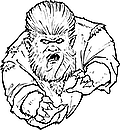• lycanthropy •
Pronunciation: lai-kæn-thrê-pi • Hear it!
Part of Speech: Noun
Meaning: 1. The supposed power of certain human beings to convert themselves into wolves or the belief in such a power. According to the Century Unabridged Dictionary, "This belief is still common among savage races, and still lingers among the ignorant of some civilized peoples." 2. The delusion that one has become a wolf.
Notes: Today's word is distinguished from zoanthropy in that the latter is the belief that someone is any animal.  Lycanthropy means specifically that the animal is a wolf. This means that lycanthrope is the technical term for a werewolf, the term you would want to use at a medical convention. The adjective is lycanthropic, as in 'a lycanthropic society', an organization of people who think themselves part-time or full-time wolves. A philanthropic lycanthropic society would be an organization devoted to financially promoting the welfare of werewolves. (We thought you might like to know.)
Lycanthropy means specifically that the animal is a wolf. This means that lycanthrope is the technical term for a werewolf, the term you would want to use at a medical convention. The adjective is lycanthropic, as in 'a lycanthropic society', an organization of people who think themselves part-time or full-time wolves. A philanthropic lycanthropic society would be an organization devoted to financially promoting the welfare of werewolves. (We thought you might like to know.)
In Play: This word comes in handy around Halloween when scary stories and movies abound: "Lycanthropy is passed on by bites, but it is brought out by a full moon." It could be used metaphorically to refer to the metaphorical wolves that pester women: "Why don't you report that lycanthropic dolt to the human relations board; maybe then he will stop stalking you."
Word History: Today's Good Word is based on Greek lykanthropos "wolf-man" comprising lykos "wolf" + anthropos "man". The Proto-Indo-European root underlying lykos was wlkwo-, with a vocalic [l]. We know that because the Russian and Czech words for "wolf" are volk and vlk, respectively. It somehow evolved into German Wolf and English wolf, also found in werewolf. The were in this word comes from PIE wiro- "man", found in Latin vir "man", the root in virile. Although traces of it have vanished from world, this word originally was wer-ald "man-age", based on the same root. Latin lupus "wolf" is probably also related, though it is as difficult to explain the shift of [k] to [p] as it is the development of [k] to [f] in German and English.
P.S. - Register for the Daily Good Word E-Mail! - You can get our daily Good Word sent directly to you via e-mail in either HTML or Text format. Go to our Registration Page to sign up today!




